“We never give up on our patients. We are proud of our mission, which is to serve the most vulnerable.”
Your donation can help Dr. Clermont and our entire staff care for more patients than ever before.
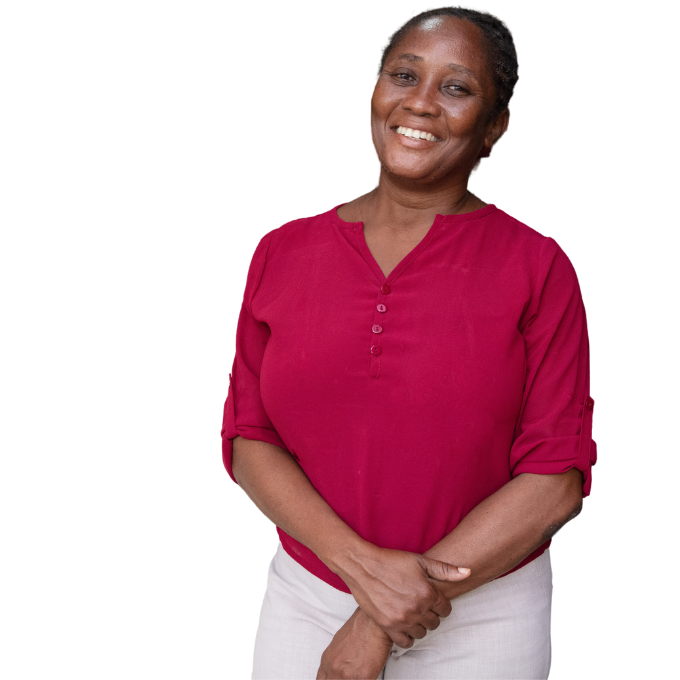
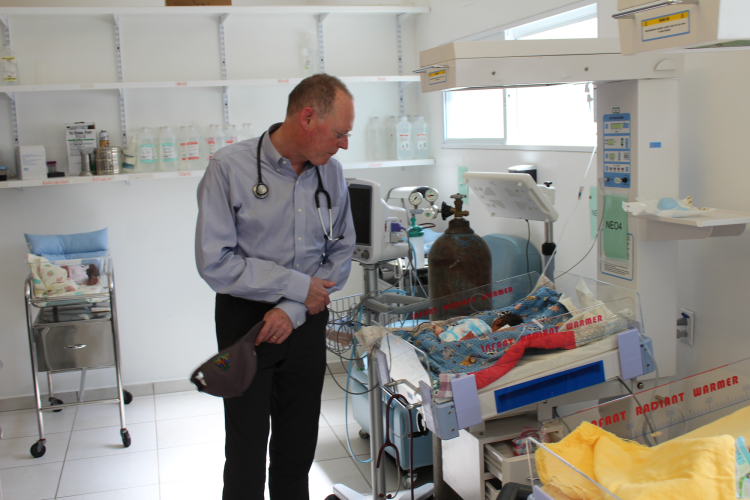
Dr. Paul Farmer looks in on a young patient in our neonatal intensive care unit in 2016.
Dear Friends,
Like so many of you, I am still in shock that Dr. Paul Farmer passed away earlier this week. His death is heartbreaking and hard to process. It is hard to fathom that he is gone. Most importantly, our thoughts are with his wife Didi and his children during this unimaginably difficult time.
I was lucky enough to first meet Paul as an undergrad in Vermont more than 20 years ago. He was visiting in the dead of winter and had forgotten his winter coat. He gave his lecture during the Super Bowl, very few people had heard about his work, and as a result there was almost no one in the lecture hall. But those of us who were there stayed up late with Paul listening to his vision for global health equity. He cared more deeply for his patients than anyone I had ever met, and he was also hysterically irreverent.
In the years that followed, I was fortunate enough to continue to learn from Paul through meetings in Boston, continued e-mail correspondence, and epic “tap tap” rides to Cange from our base in Fond des Blancs. I once watched him translate for more than nine hours straight at the annual PIH/Zanmi Lasante Health and Human Rights Conference while cracking jokes in Haitian Creole that sent the crowd into constant laughter. But most importantly, Paul was there pushing for all of us to embrace a paradigm shift in global health.
When I first arrived in Fond des Blancs in 2003, it was the height of the HIV/AIDS crisis in Haiti. Our clinic and other health care facilities throughout the country were filled with patients dying from AIDS in the primes of their lives. However, if you took a quick flight to Miami, HIV had turned from a death sentence to a chronic illness starting with the onset of anti-retroviral therapy (ART) in 1996. Seven years after the discovery of lifesaving treatment, millions of patients throughout the world were dying simply because their lives were not deemed to be as important as those with access to treatment.
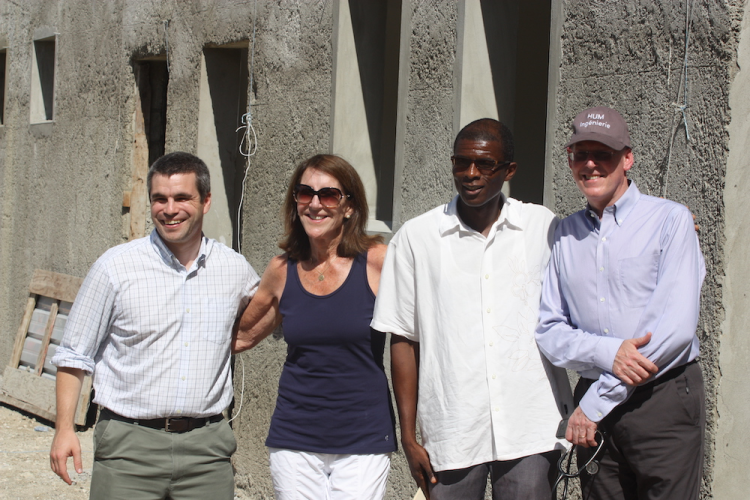
Dr. Farmer with HEI/SBH Director General Dr. Inobert Pierre, Board Member Barrie Landry, and President and CEO Conor Shapiro outside SBH’s surgical center during its construction.
Paul and his team started to provide ART in the Central Plateau in Haiti despite tremendous pushback from public health officials throughout the world. People were concerned the treatment wasn’t “cost-effective” or “sustainable”. Millions were dying but somehow, “limited resources should be spent on prevention instead of treatment.” Paul, his team in Haiti, and those who fought for health equity won the debate through action and bending political will. The rest is history. Millions are now alive today because of access to ART and the HIV/AIDS tide in resource-poor settings around the world has turned.
With Paul’s mentorship, we started SBH’s HIV/AIDS program in 2004. Patients who started ART at that time still, to this day, visit our hospital regularly for follow-up care and receive home visits from our community health team. Our patients have been able to see their children graduate from school, play with their grandchildren, and become key members of the local community all because of Paul and his team’s efforts.
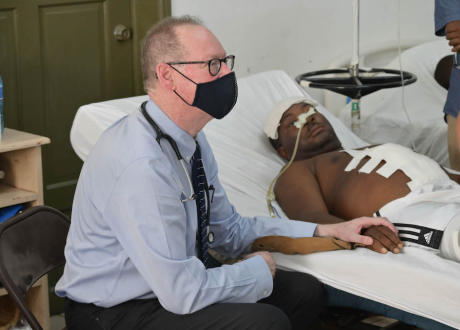
Dr. Farmer sits with a survivor of the August 2021 earthquake in SBH’s surgical recovery room.
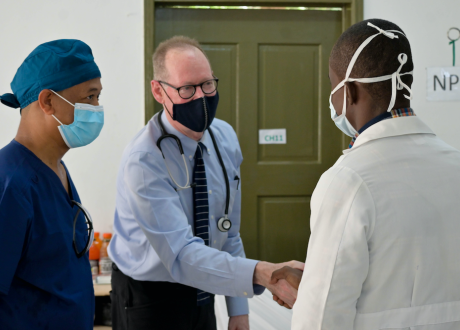
Dr. Farmer greets clinicians at SBH after the August 2021 earthquake.
Paul continued to be the catalyst for our growth in Fond des Blancs. From starting our national center for spinal cord injury after the 2010 earthquake to our massive hospital expansion, he was there to provide wise counsel and to continue to push us to do everything we could for our patients. He joined our Board of Directors at HEI/SBH, corresponded regularly with our clinical team, and was one of the first to visit when we dealt with the horrific earthquake this past August 14th. He always pushed us to do more, to be a model for health equity, and to keep our patients at the center of all that we do.
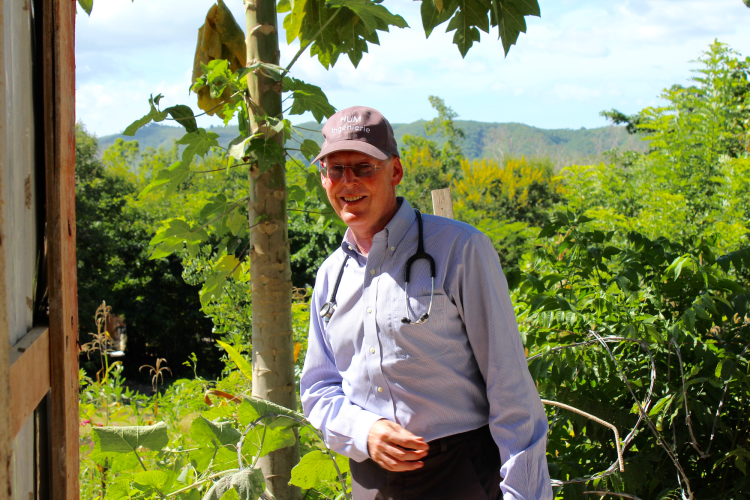
Dr. Farmer in Fond des Blancs.
Perhaps the strongest lesson we learned from Paul was to not accept a given as a given. We should absolutely question why Haiti still does not have access to the HPV vaccine despite having the highest rate of cervical cancer in the world; why SBH is the only fully functioning 24/7 center for emergency obstetric care for over 2 million people in the southern peninsula; or why there was such an embarrassingly weak international response to August’s devastating earthquake. Paul taught us to interrogate, take action and push back on anything that accepts patients’ needless suffering simply because they don’t have the resources to access basic healthcare.
I think the idea of global health equity can oftentimes be understood as a nice ideal, cute bumper sticker, or vague objective. Being around Paul you realized that health equity was not an ideal but a tangible imperative, something that our patients desperately need for all of us to get right. Paul was always pushing us to try to provide the same care to those who came through our doors as we would for our own families. He loved his patients, and he loved the people who provided care to them.
As others remember Paul fondly from countless contexts around the world, I remember a warm summer night in Haiti where Paul was looking at x-ray film from hospital rounds at the dinner table, surrounded by clinicians and holding court under the stars.
Paul has gone way too soon. His sudden loss is very difficult for me and our team to comprehend. He was an incredible friend and a remarkable teacher. May we all honor his legacy by channeling his drive for health equity and never accepting a given as a given, especially when it comes to health systems for those who need it most. And may we honor “Polo” by continuing to give everything we can to this urgent and critical work.
Kenbe fèm,
Conor Shapiro
President and CEO
Health Equity International/St. Boniface Hospital
Your donation can help Dr. Clermont and our entire staff care for more patients than ever before.
